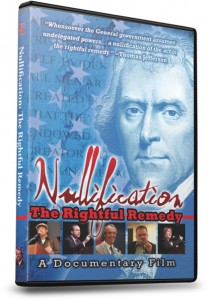
Veto, It’s not just to kill your political oppositions bills,
It works to kill unconstitutional bills as well…
Oftentimes, politicians try to make their atrocious acts more palatable by promising not to use the full scope of power that they’re usurping. But does it really matter what any single politician actually does in this respect if the succeeding politician swears to no such oath? If they are able to do it under the law, eventually they or one of their successors will!
I would like to give a couple of instances where just such a thing has happened.
Everybody remembers Obama’s famous words while signing possibly the most UNCONSTITUTIONAL act in recent history (yes, that does include Obamacare):
” I want to clarify that my Administration will not authorize the indefinite military detention without trial of American citizens,” wrote Obama. “My Administration will interpret section 1021 in a manner that ensures that any detention it authorizes complies with the Constitution, the laws of war, and all other applicable law.”
Why then, if he wasn’t planning on detaining Americans indefinitely, and he thinks (as implicated by aforementioned statement) that the offending sections of the law are unconstitutional, did he sign it? “The President” has an “axe” to kill laws should they violate the Constitution. The veto power is not restricted to killing bills that are in opposition politically to the favored groups of the President. It was intended to be used to kill just such monstrosities as the 2012 NDAA. Instead, Obama just signed it and claimed that he wouldn’t misuse it. Has he…? Truth is, nobody knows. Any definite detention without trial would presumably be undisclosed, and without trial implies no judicial oversight… Regardless, his or another successor will.
How about George W. Bush. when signing McCain Feingold campaign finance reform :
“However, the bill does have flaws. Certain provisions present serious constitutional concerns. In particular, H.R. 2356 goes farther than I originally proposed by preventing all individuals, not just unions and corporations, from making donations to political parties in connection with Federal elections. I believe individual freedom to participate in elections should be expanded, not diminished; and when individual freedoms are restricted, questions arise under the First Amendment.
I also have reservations about the constitutionality of the broad ban on issue advertising, which restrains the speech of a wide variety of groups on issues of public import in the months closest to an election. I expect that the courts will resolve these legitimate legal questions as appropriate under the law.”
So again… why sign the bill if it’s -according to his own words- unconstitutional!? With the average Americans’ prevailing understanding of the Constitution, it’s safe to say that if the President thinks a federal law might be unconstitutional, then it most certainly is. Still, he didn’t even promise not to exercise the authority in an unconstitutional manner; he just signed it as if to say “Yeah, I’m breakin’ the law… what are you gonna do about it?”
I could cite many more examples, and yet the question always turns into a personal insult on the current President. For instance, I remember during the George W. Bush administration, Rush Limbaugh would defend the Patriot Act simply by making fun of anyone concerned that it allows spying on citizens. George W. Bush’s claim was that if you’re calling someone a terrorist, then the feds should know about it. But what is ignored is that the law allows for much more than simply spying on terrorists. “It” allows for people to be able to check on which books ANYONE has checked out of the library, as well as the spying on of people- without any oversight! Not to mention the biggest concern… There is nowhere in the Constitution any authorization whatsoever for the Federal government to spy upon American citizens. The administration claimed that they would never misuse it, but how would we know if they did? And even more importantly, that someone won’t in the future? Just look at Obama… who has criticized said law his entire candidacy, and yet, not only is “it” still a law… but the Anointed One has expanded it AND renewed it three times!!!
When James Madison was asked to sign a law for transportation infrastructure of which he thought was a violation of the Constitution, he did not issue a “signed statement,” he issued a Veto. Here is the quote:
“Having considered the bill this day presented to me entitled ‘An act to set apart and pledge certain funds for internal improvements,’ and which sets apart and pledges funds ‘for constructing roads and canals, and improving the navigation of water courses, in order to facilitate, promote, and give security to internal commerce among the several States, and to render more easy and less expensive the means and provisions for the common defense,’ I am constrained by the insuperable difficulty I feel in reconciling the bill with the Constitution of the United States and to return it with that objection to the House of Representatives, in which it originated.”
THAT, my friend, is an appropriate response from a Federal officer who is faithfully ensuring a legal exercise of the role he has been entrusted with. We should try to elect the politicians who could be trusted to respond to offers of power as Madison did with 2-letter answers of NO (actually, 4-letter answers of VETO, but you get the drift).
Along with this electoral strategy, we should strive to nullify ALL of the laws that are enacted in clear violation of the Constitution (also known as the Supreme law of the land)
- Watertight Integrity and the American Federation - November 7, 2013
- Monopoly Government - November 25, 2012
- No More Signing Statements. Veto! - October 21, 2012

